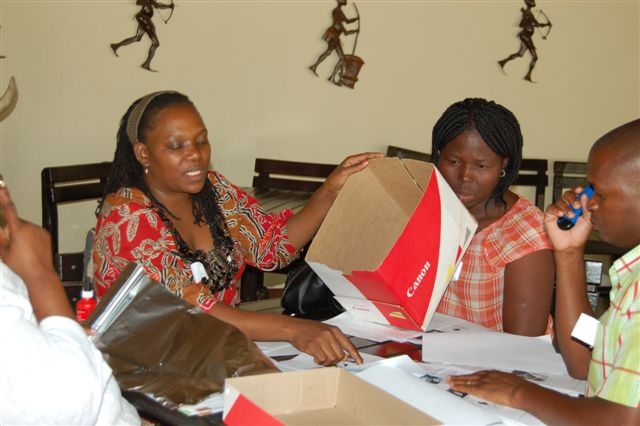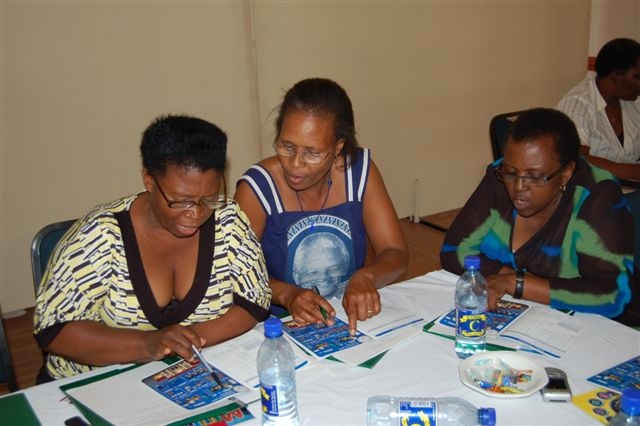Raising a new generation committed to sustainable practices
|
As practical activity the educators were divided into groups to design and construct a solar stove using cardboard box and aluminium foil (Picture © Joe Sibiya) |
|
The educators learn how to conduct an energy audit (Picture © Joe Sibiya) |
Raising a new generation committed to sustainable practices
SAEON has run two innovative workshops from its Phalaborwa-based Ndlovu Node to assist teachers in the region to develop an understanding of the new curriculum statements for grades 10 to 12. The workshops also illustrated how environmental education could be incorporated into the curriculum with minimum effort, and to maximum effect.
In the first of these workshops – Ndlovu Node’s Educators Workshop for 2008 - the emphasis fell on the new curriculum statements. The key objectives were to ensure that all educators were at the same level of understanding of the curriculum documents, and had established an understanding of where and how the environment could be integrated into the curriculum.
The workshop was attended by the core group of educators with whom SAEON’s education outreach team has been working since the inception of the SAEON Ndlovu Node in 2004.
The group of 17 educators who attended the workshop included representatives from almost all the schools in the region, ranging from township schools to a private school in the town of Phalaborwa.
The presenter, Shanu Misser of the Delta Environmental Centre in Johannesburg, started the workshop by taking the educators right back to the South African constitution which stipulates that every South African citizen has the right to an environment that is not harmful to their health or well-being; and to have the environment protected, for the benefit of present and future generations.
The educators, who teach subjects ranging from languages to maths to geography, were shown ways in which the environment could form an integral part of their teaching. Themes covered ranged from energy use and management to biodiversity.
“It is my responsibility to ensure that the educators understand how the environment can be incorporated into the new curriculum,” says Sibongile Mokoena, SAEON’s education outreach coordinator.
As practical activity the educators were divided into four groups to design and construct a solar stove using cardboard boxes and aluminium foil. Misser circulated among the groups to demonstrate techniques and give advice. She explained the scientific principles that made the stove work.
The participants were intrigued and excited. At the end of the practical session, each group presented their stoves and explained how they intended to use them. “This is a project we could easily undertake with our learners,” they concluded.
The workshop was a valuable team-building exercise, forging strong relations between participants from various schools. “From now on they will be sharing ideas and educational material,” says Mokoena.
The workshop was concluded by handing out certificates to educators who had successfully completed an accredited course on Introduction to Environmental Education towards the end of last year.
Breaking new ground in education outreach
The SAEON Ndlovu Node joined forces with Eskom to spearhead a workshop for educators in hands-on energy-saving practices aimed at sustainable energy use. The special Teachers Tearoom Forum1 was held at Mopani Country Lodge in Phalaborwa.
The theme of this second initiative was “Reducing energy consumption”. The objectives were to raise awareness of the national energy crisis in South Africa; develop skills in tracking the use of energy through energy audits (in the home and in the school); get input from schools without electricity; share energy reducing strategies; and integrate the topic reduction of energy consumption into the National Curriculum Statement.
The workshop was organised by Joe Sibiya, education outreach officer of the SAEON Ndlovu Node, and facilitated by education consultant Rajen Pillay and Eskom education officer Brigitte Morais, in conjunction with SAEON. Pillay is an independent science education evaluator who had been responsible for the SAEON Ndlovu Node’s education outreach evaluation for the period 2004 to 2006 (see Annexure C).
“I wanted to take this concept to a place in South Africa where I knew it would work,” said Pillay.
The forum was attended by 71 educators and school principals from secondary and primary schools. The delegates were given practical tips on how energy can be saved.
“It was a long day,” says Joe, “but such was the interest in the topic of sustainable energy that the energy levels of the participants were sustained.”
Reflecting on the success of the workshop, Mokoena said that it was SAEON’s objective to raise a generation of people with awareness where it matters most, namely of sustainable practices.
Another positive spin-off was the attendance of staff from the local Eskom office, cementing the relationship between Eskom and the SAEON Ndlovu Node.
To conclude, Sibiya said: “We at SAEON will keep on building and strengthening sound educational practices at Phalaborwa and elsewhere in the country where the other SAEON nodes are located.”
- The SAEON Ndlovu Node instituted regular Teachers Tearoom Forums to train the Ba-Phalaborwa teachers in environmental science, and to involve them in national science-awareness programmes such as National Science Week and Women in Science.
|
Evaluation The educators’ evaluation forms for the Ndlovu Node’s Educators Workshop for 2008 included the following statements:
On what they were taking away:
On the workshops:
|




